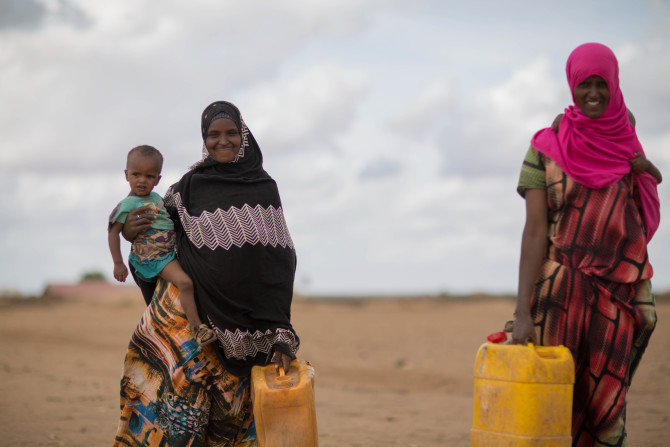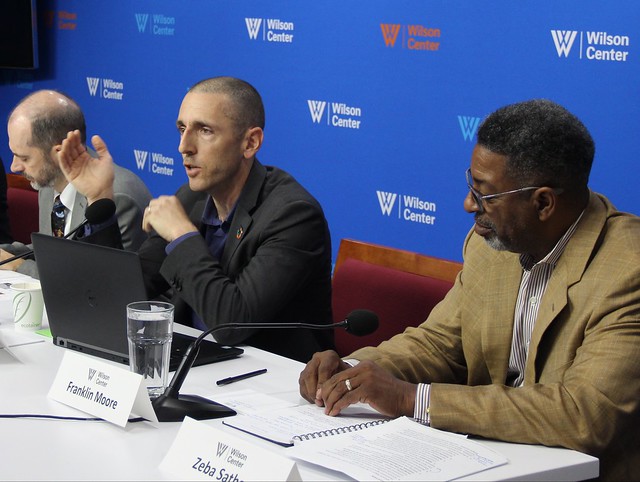-
A More Resilient World: The Role of Population and Family Planning in Sustainable Development
June 27, 2018 By Olivia Smith
“Community mobilization, local capacity-building, and innovation are the cornerstones of successful development. And that for us includes resilience,” said Franklin Moore, Africare’s Chief of Programs, at a Wilson Center event on family planning and sustainable development. As rapid population growth intersects with challenges like food insecurity and water scarcity, communities in developing countries need not only the capacity to absorb short-term shocks, they also need transformative capacity to address long-term challenges.
Tailored education campaigns can engender lasting change, said Moore. In the Sahel region, Africare’s “husband schools” teach men about the health and nutrition benefits of child-spacing. Such efforts help communities “make some transitions and behavioral shifts and to adopt new innovations,” said Moore. “Transformative capacity is where we find the innovations and institutional reform, behavior shift, and cultural change.”
Securing Water to Ensure Stability
Water security means “providing water for a multiplicity of users to support life on this planet and to support human activities,” said Eric Viala, Director of the Sustainable Water Partnership. Water is essential for life, but also for public health, energy production, and agriculture. Each person in the developed world uses enough water to fill an Olympic swimming pool every year, said Viala—and as the world’s population grows, so will the total demand for water.
The ongoing water crisis in Pakistan, where the population is predicted to reach 300 million by 2050, “has brought the population issue also on to the table,” said Zeba Sathar of the Population Council, who spoke from Islamabad via Skype. This conversation—“between people who work on water issues, food issues, and population issues [has been] largely absent,” she said. It is “the shortage of water that’s bringing home the crisis of both water shortages and, of course, population growth and unmet need.”
Changing Farms to Feed Families
“Seventy percent of water we use on this planet goes to food production,” said Viala. “If you don’t have the water to produce food, you can’t eat.” Severe droughts can lead to hunger, even famine; while too much water—floods—can swamp farmland.
Families in many developing countries depend on subsistence farming for both food and livelihoods. As families grow, “that family farm…will have to be divided—so if they are struggling with the plot of land they have now, they’re cutting it in half,” said Jason Bremner of Family Planning 2020. Due to population growth, “the hectares per family farm has declined over time,” he said, threatening food security and economic development.
To help communities adapt, Africare works with farmers to plant drought-resistant cowpea as well as forage sorghum, which can be used to feed livestock in times of drought. Through its community-led food security and distribution groups, Africare provides information not only on farming, but also on nutrition, health, and family planning, which helps members to both “make changes that relate to child-spacing and changes in agricultural practices that increase the nutritious food they are producing both for mothers and pregnant women,” said Moore.
Seeking Shelter From the Storm
As population grows, so does the number of people affected by extreme weather—particularly in the most vulnerable parts of the world, including coastal areas, arid regions, and flood zones. For example, Nigeria—the most populous African country—is growing rapidly. “There are 200 million today, and there are going to be around 400 million by 2050,”said Bremner. The severe drought in the Lake Chad region, combined with the ongoing violence from Boko Haram, has contributed to the country’s millions of internally displaced people, said Bremner, pushing some to leave the country: Nigeria was the largest origin country for migrants to Italy in 2016, he said.
In Pakistan, severe flooding in 2010 destroyed homes and livelihoods, forcing many residents along the Indus River to seek safety or employment elsewhere. A unique study conducted by the Population Council found that women affected by the flooding not only increased female employment, but also increased access to family planning and maternal health care, due to the presence of international relief organizations. Women were “able to absorb new changes in behavior,” which manifested in “a sharp uptick in contraceptive use” and “greater involvement in economic work,” said Sathar.
Integrated Approaches for Interlinked Challenges
“Most leaders understand that population growth has a major impact on stability,” said Viala. The African Union, for example, has seen success “linking the reduction in fertility, and favorable birth spacing patterns, with a demographic dividend…with positive development outcomes,” said Sathar.
To build more resilient communities, “it is really critical that we understand these interlinked challenges and we find new ways of doing business, as business as usual—standard family planning programs, our standard efforts of reaching communities with water and environmental issues—are going to be further stressed,” said Bremner. “Until we find different ways of doing business, then we will continue to see interconnectedness as innovation, instead of interconnectedness as being the way of doing business.”
Event Resources:
Sources: Central Intelligence Agency, Inter Press Service, Population Council, Water Footprint Network
Photo Credit: Girls in Jigjiga, Jila Alu Kebele on their way to fetch water from the nearby water point, April 2016, courtesy of UNICEF Ethiopia/Tesfaye
Topics: Africa, agriculture, community-based, demography, development, disaster relief, environment, extreme weather, family planning, featured, flooding, food security, From the Wilson Center, gender, global health, humanitarian, livelihoods, media, migration, Nigeria, Pakistan, PHE, population, risk and resilience, video, water
 A Publication of the Stimson Center.
A Publication of the Stimson Center.




